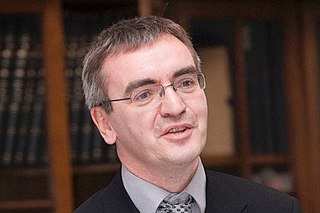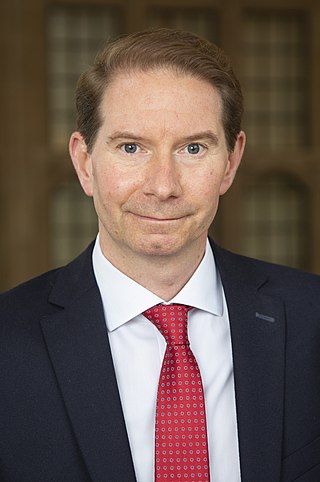The Science and Engineering Research Council (SERC) and its predecessor the Science Research Council (SRC) were the UK agencies in charge of publicly funded scientific and engineering research activities, including astronomy, biotechnology and biological sciences, space research and particle physics, between 1965 and 1994.
Biotechnology and Biological Sciences Research Council (BBSRC), part of UK Research and Innovation, is a non-departmental public body (NDPB), and is the largest UK public funder of non-medical bioscience. It predominantly funds scientific research institutes and university research departments in the UK.
Doctoral Training Centres are centres for managing the Research Council-funded PhD degrees in the United Kingdom. Typical UK PhD students take three years to complete their doctoral research under the guidance of an academic supervisor or small supervisory team, and tend to be located within an existing research group. By contrast, each DTC involves a UK university in delivering a four-year doctoral training programme to a significant number of PhD students organised into cohorts. Each Centre targets a specific area of research, and also emphasises transferable skills training. The model has been adopted by all seven Research Councils.
The Doctor of Engineering is a professional degree awarded in engineering and applied science. An EngD is a terminal degree similar to a PhD in engineering but applicable more in industry rather than in academia. The degree is usually aimed toward working professionals.

Research Councils UK, sometimes known as RCUK, was a non-departmental public body which coordinated science policy in the United Kingdom from 2002 to 2018. It was an umbrella organisation that coordinated the seven separate research councils that were responsible for funding and coordinating academic research for the arts, humanities, science and engineering. In 2018 Research Councils transitioned into UK Research and Innovation (UKRI).
The Economic and Social Research Council (ESRC), formerly the Social Science Research Council (SSRC), is part of UK Research and Innovation (UKRI). UKRI is a non-departmental public body (NDPB) funded by the UK government. ESRC provides funding and support for research and training in the social sciences. It is the UK's largest organisation for funding research on economic and social issues.
The Science and Technology Facilities Council (STFC) is a United Kingdom government agency that carries out research in science and engineering, and funds UK research in areas including particle physics, nuclear physics, space science and astronomy.
Dame Lynn Faith Gladden is the Shell Professor of Chemical Engineering at the University of Cambridge. She served as Pro-vice-chancellor for research from 2010 to 2016.

David Michael Gann CBE is a British academic administrator and civil engineer. He is Vice-President (Innovation) at Imperial College London and a member of the College's Executive Board. His academic research spans strategy, management science and systems engineering.

The Alan Turing Institute is the United Kingdom's national institute for data science and artificial intelligence, founded in 2015 and largely funded by the UK government. It is named after Alan Turing, the British mathematician and computing pioneer.
In 2008 Queen's University Belfast's Institute of Electronics, Communications and Information Technology (ECIT) was chosen to host the Centre for Secure Information Technologies ('CSIT), one of only seven UK Innovation and Knowledge Centres (IKCs). Funded by the Engineering and Physical Sciences Research Council (EPSRC) and UK Technology Strategy Board, IKCs are a key component of the UK's approach to the commercialisation of emerging technologies through creating early stage critical mass in an area of disruptive technology. CSIT is recognised by GCHQ and EPSRC as an Academic Centre of Excellence in Cyber Security Research (ACEs-CSR). It was one of the first tranche of eight UK universities conducting world class research in the field of cyber security recognised as ACE-CSRs in 2012. CSIT also an annual World Cyber Security Technology Research Summit at the ECIT Institute in Belfast.

The Henry Royce Institute is the UK’s national institute for advanced materials research and innovation. Its vision is to identify challenges and to stimulate innovation in advanced materials research to support sustainable growth and development. Royce aims to be a "single front door" to the UK’s materials research community. Its stated mission is to “support world-recognised excellence in UK materials research, accelerating commercial exploitation of innovations, and delivering positive economic and societal impact for the UK.”

Tom Rodden is Chief Scientific Adviser for the UK Government’s Department for Culture, Media and Sport. He was previously Deputy Chief Executive of the Engineering and Physical Sciences Research Council (EPSRC). Tom is Professor of Computing at the University of Nottingham and co-director of the Mixed Reality Laboratory, an interdisciplinary research facility. In 2008, as a member of the UK Research Assessment Exercise 2008 computing panel, he was responsible for assessing the international quality of computer science research across all UK departments. In 2014 he served in the Research Excellence Framework assessment panel for computing and he is the deputy chair of the Hong Kong RAE 2014 computing panel.
Susan Rosser is a professor of Synthetic Biology at the University of Edinburgh.
Marina Denise Anne Jirotka is professor of human-centered computing at the University of Oxford, director of the Responsible Technology Institute, governing body fellow at St Cross College, board member of the Society for Computers and Law and a research associate at the Oxford Internet Institute. She leads a team that works on responsible innovation, in a range of ICT fields including robotics, AI, machine learning, quantum computing, social media and the digital economy. She is known for her work on the 'Ethical Black Box', a proposal that robots using AI should be fitted with a type of inflight recorder, similar to those used by aircraft, to track the decisions and actions of the AI when operating in an uncontrolled environment and to aid in post-accident investigations.
Elham Kashefi is a Professor of Computer Science and Personal Chair in quantum computing at the School of Informatics at the University of Edinburgh, and a Centre national de la recherche scientifique (CNRS) researcher at the Sorbonne University. Her work has included contributions to quantum cryptography, verification of quantum computing, and cloud quantum computing.
The Rosalind Franklin Institute is medical research centre supported by the Government of the United Kingdom located at the Harwell Science and Innovation Campus, Oxfordshire, England. It is named after an English chemist Rosalind Franklin, whose discoveries provided the key data for the correct explanation of the helical structure of DNA in 1953. Launched on 6 June 2018, it was officially opened on 29 September 2021.
Stephen John Haake is a British sports engineer. He is professor of sports engineering at Sheffield Hallam University, England and is founding director of the university's advanced wellbeing research centre.
Sadie Creese is a British cybersecurity specialist. She is Professor of Cybersecurity in the Department of Computer Science at the University of Oxford, Director of the Global Cyber Security Capacity Centre at the Oxford Martin School, co-director of the university's Cyber Security Centre and of the Martin School's Institute for the Future of Computing, and a fellow of Worcester College, Oxford.

Stephen A. Jarvis is a British Computer Scientist, academic, and academic administrator. He is currently Provost and Vice-Principal at the University of Birmingham. Prior to this he served as Pro-Vice-Chancellor at the University and Head of its College of Engineering and Physical Sciences.






